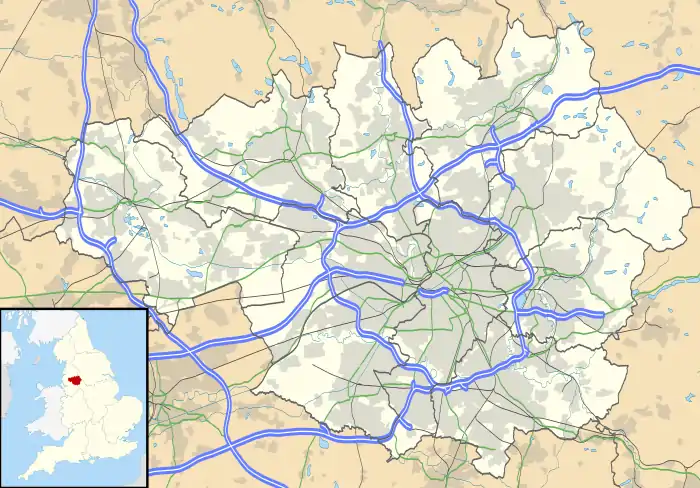Heaton Park BT Tower
Heaton Park BT Tower is a 238 foot (72.54 metres) tall telecommunication tower built of reinforced concrete close to the banks of Heaton Park Reservoir, at Heaton Park, Manchester, England. Heaton Park BT Tower is one of the few British towers built of reinforced concrete, and one of seven BT towers of the 'Chilterns' design.
 Heaton Park BT Tower (left) | |
 Heaton Park BT Tower (Greater Manchester) | |
| Location | Heaton Park, Manchester |
|---|---|
| Coordinates | 53.539583°N 2.255208°W |
| Grid reference | SD8308804828 |
| Built | 1960s |
During the Cold War, the British government proposed a communications network that (it was hoped) would survive a nuclear attack. Radio stations (including the Heaton Park Tower) would maintain national and international communications before, during and after a nuclear emergency, transmitting microwave radio signals in a network known as Backbone. Spurs feeding into the network were provided at three location; London (BT Tower) , Manchester (Heaton Park Tower) and Birmingham (BT Tower (Birmingham)).[1] Whether the plan for the Backbone network was realized is information protected by the Official Secrets Act 1911[2] but, during the planning process, HM Government denied in Parliament that there was anything secretive about the tower or its function.[3]
Beside the tower was a monitoring station (one of hundreds across the country) to record the blast and fallout in the event of a nuclear war. The station provided for three men from the Royal Observer Corps (ROC) to live underground whilst recording what was happening above ground in the event of a nuclear strike.[4]
References
- "Backbone radio link and radio standby to line links for safeguarding vital communications - Your Archives". webarchive.nationalarchives.gov.uk. Archived from the original on 20 June 2013. Retrieved 24 May 2018.
- "The Cold War secret Communication System called Backbone and Lancashire". www.lancashireatwar.co.uk. Retrieved 24 May 2018.
- "CONCRETE RADIO TOWERS (Hansard, 18 December 1962)". hansard.millbanksystems.com. Retrieved 24 May 2018.
- "Heaton Park in World War Two and World War One - RAF training base". www.lancashireatwar.co.uk. Retrieved 24 May 2018.
